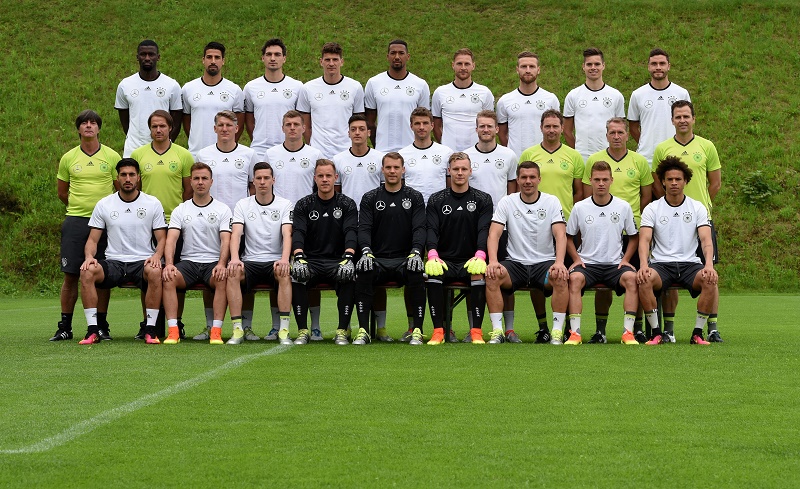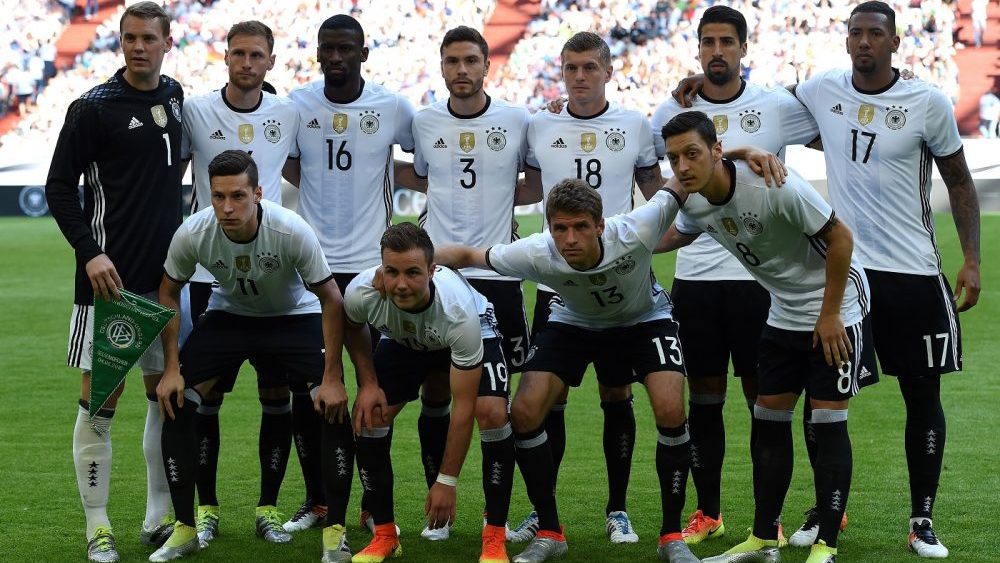FC Bayern players in the German national team
A few days before the EURO 2016 kicks off we want to analyse the roles of the these players in Jogi Löw’s squad.
Manuel Neuer
The position of the World Goalkeeper of the Year is probably as undisputable as no other in the squad. Especially in the World Cup 2014 the former Schalke player has proven his worth. Everyone remembers the game against Algeria, in which Neuer secured the quarter-final with numerous risky trips outside of his box. Even in the latter stages of the tournament the 30-year old impressed and became one of the players of the tournament. Eventually he did not only win the trophy for the best keeper of the World Cup, he also made the final three for the Ballon d’Or. Particularly in the national team where the defence can’t be as well-rehearsed as on club level, a lot depends on the man between the sticks. Manuel Neuer can and must make the difference here. With his build-up play and his extraordinarily high football IQ for a keeper, he’ll be a huge help for the newly assembled defence.
Jérôme Boateng and Mats Hummels
As of now, Mats Hummels is still a BVB player but it’s worth to include him in this list. Just like the World Cup in Brazil the former and future Bayern player will play an important role. Back then he already formed the best centre-back duo with Jérôme Boateng. Both complemented each other well, with Germany only conceding four goals and collecting four clean sheets in the tournament. If one of them had a rough day, the other one stepped up. In possession Boateng is responsible for long balls, while Hummels is opening up the play with precise dribblings or low and sharp passes. Both will shape the build-up, dictate the tempo and decide how clean Germany’s ball circulation will be. Against the ball Boateng will have to cover his partner when he moves out of the formation. In the past they have been in sync in this process. Hummels anticipated many moves from the opponent and even when he misjudged it, his counterpart was there to clean it up.
Not only Jogi Löw can consider himself lucky to have this duo, but also Carlo Ancelotti will take a very close look. One could see the EURO 2016 as test run for the upcoming season. It will be rather interesting to see however, if both can reach their maximum performance levels. Boateng was out for nearly the whole second half of the Bundesliga season and only slowly regained his regular form towards the end. There are doubts with Hummels too. He ruptured a muscle fibre in the DFB cup final and is likely to miss the opening game. The 27-year old will have to regain his form throughout the tournament. Both are very experienced and important pillars for Löw’s team, that’s why it’s absolutely important that the future centre-back duo is fit in due time.
Thomas Müller
Müller faces higher expectations compared to previous tournaments. Miroslav Klose hung up his boots for the national team and isn’t available anymore, whereas it’s yet to be seen if Mario Gomez can replicate his strong performances from the EURO 2012. Müller is the only constant in attack. Furthermore, he’s a flexible player. Löw can deploy him in the half-space, on the wing or up front. It’s widely known that Thomas Müller is a big game player. If Germany want to get far, they’ll need the 26-year old in his best form to make the last steps towards the title. Even off the pitch the Bayern forward will be vital. For one the Upper-Bavarian creates a good atmosphere and secondly, he gathered a lot of experience which he can share with the younger players of the squad. Müller has become a leader and is one of the captains of the team.
Mario Götze
The EURO 2016 will be rather thrilling for Götze. He will have to deal with a similar role as in the World Cup 2014, where he only started in a few games. Even his important goal against Argentina in the final he scored coming off the bench. Götze can prove himself at the EURO 2016 and thus create different options for his next career steps. One of them is his not ultimately decided stay in Munich. Statements from Ancelotti and Rummenigge have pointed towards an early exit, but Götze himself said he wants to stay at Bayern. In 2015 he emphasized that he’d like to become one of the “faces“ of the record champion. For that to happen a lot is still missing. After parting way with his agent and making some promising statements he has made steps in the right direction. The 24-year old will definitely get game time though. If he can perform convincingly and contribute with his finishing abilities, a key role in the offence is possible.
Joshua Kimmich
Joshua Kimmich is the debutant in the national team. It’s tough to judge his role. If Jogi Löw has the necessary trust in the 21-year old, he could partially close the gap Lahm left behind. As a right-back he could probably help the team more than Emre Can. Löw made indications that he could play there. Kimmich’s role isn’t only dependant on Löw’s plans with him personally but rather the basic strategy. If the national team manager plays a three- or five-at-the-back formation, the chances of Kimmich playing improve. He couldn’t convince as a half-defender against Slovakia throughout most of the game, although the role as a wing-back could suit him well. The skilled midfielder would have freedom to go forward and also show his defensive abilities. In addition, he would also be covered in that formation and free to take some risk. With Jogi Löw deciding against Sebastian Rudy and in favour of Joshua Kimmich shows that the national team manager has acknowledged the outstanding talent of the debutant. His role is dependant on how well he gets into the tournament. If he gets minutes early, he has to use them. Playing well could mean he’s making a big step towards a spot in the starting eleven. It’s also possible that it’s too early for Kimmich and that he ends up getting very few, maybe even no minutes on the field.

(Photo: Patrik Stollarz / AFP / Getty Images)
Former FC Bayern players
With Toni Kroos, Bastian Schweinsteiger, Mario Gomez, Emre Can and Lukas Podolski there are five more players who’ve played at FC Bayern before. The latter won’t have big opportunities to showcase his abilities though. Podolski is an important piece to the atmosphere in the team, an often underrated aspect. Besides that, he still offers some athletic qualities many tend to overlook. Podolski is a straight-forward player who could potentially be a super-sub for Löw. That Löw only selected him as a “mascot“ is disrespectful which the player has addressed himself at a press conference. Podolski has a spot in the far end of the squad and those aren’t always chosen by performance but by importance for the squad structure.
It’s also open what role Emre Can will have. He’s one of Kimmich’s main rivals for the biggest open question: the right-back position. He’s in the same boat as his competitor. If Can would get the trust in the group stages and convince Löw, he’ll probably play in the knock out stages. It’s much easier to analyse Mario Gomez’ situation. The striker has repeatedly emphasized that he’ll subordinate to the team. In 2013, when Bayern won the treble he got used to that role already. Gomez is a positive guy who’ll do everything to make the team successful, even if that means to sit on the bench – he can accept it. That’s why Löw gets on with him better than other strikes in the past. Gomez will get appearances but might not play at some point, because Löw sees the necessity of a more flexible striker.
The last two of the bunch are Toni Kroos and Bastian Schweinsteiger. Both are indisputable for the manager. Kroos will prove stability and connect defence and attack, while Schweinsteiger, in case he’s going to be fit, will be found all over the pitch. There’s a big question mark behind the 31-year old. His performance levels took a massive dip after the World Cup 2014, many injuries have caused set-backs. He claims that he’s already in better shapre than he was at the World Cup in Brazil at the same time. Even when he doesn’t have the same level as most of the younger protagonists, his importance to this team is still huge. Without a fit Schweinsteiger, it’s going to be very tough to win this tournament.
Because of that Germany are facing numerous problems. Philipp Lahm has left behind a huge gap, Schweinsteiger isn’t at 100% and probably won’t reach that. If the rest of the squad is able to fill that gap and execute a rather big rebuild, is still open. Germany is one of the big favourites, however, France and Spain as well as other favourites have already gone past the rebuild, while it feels like that the one for Jogi Löw’s team is far from over.









